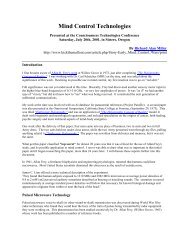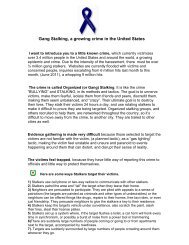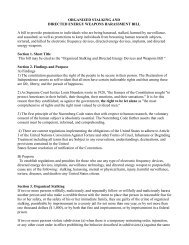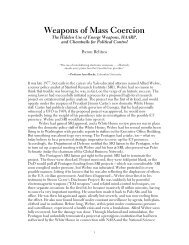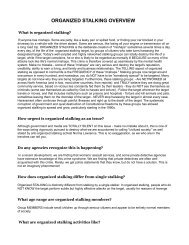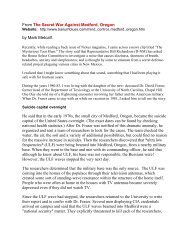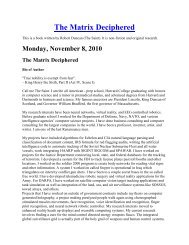Mind Games - Freedom From Covert Harassment and Surveillance
Mind Games - Freedom From Covert Harassment and Surveillance
Mind Games - Freedom From Covert Harassment and Surveillance
You also want an ePaper? Increase the reach of your titles
YUMPU automatically turns print PDFs into web optimized ePapers that Google loves.
surveillance tapered off. It was then that she began writing 1996 as a "catharsis."Colleagues urged Naylor not to publish the book, saying she would destroy her reputation.But she did publish, albeit with a small publishing house. The book was generally ignored bycritics but embraced by TIs.Naylor is not the first writer to describe such a personal descent. Evelyn Waugh, one of thegreat novelists of the 20th century, details similar experiences in The Ordeal of GilbertPinfold. Waugh's book, published in 1957, has eerie similarities to Naylor's.Embarking on a recuperative cruise, Pinfold begins to hear voices on the ship that he believesare part of a wireless system capable of broadcasting into his head; he believes the instigatorrecruited fellow passengers to act as operatives; <strong>and</strong> he describes "performances" put on bypassengers directed at him yet meant to look innocuous to others.Waugh wrote his book several years after recovering from a similar episode <strong>and</strong> realizing thatthe voices <strong>and</strong> paranoia were the result of drug-induced hallucinations.Naylor, who hasn't written a book since 1996, is now back at work on an historical novel shehopes will return her to the literary mainstream. She remains convinced that she was targetedby mind control. The many echoes of her ordeal she sees on the mind-control forumsreassure her she's not crazy, she says.Of course, some of the things she sees on the forum do strike her as crazy. "But who I am tosay?" she says. "Maybe I sound crazy to somebody else."SOME TIS, SUCH AS ED MOORE, A YOUNG MEDICAL DOCTOR, take a slightly moreskeptical approach. He criticizes what he calls the "wacky claims" of TIs who blame variousgovernment agencies or groups of people without any proof. "I have yet to see a claim of whois behind this that has any data to support it," he writes.Nonetheless, Moore still believes the voices in his head are the result of mind control <strong>and</strong> thatthe U.S. government is the most likely culprit. Moore started hearing voices in 2003, just ashe completed his medical residency in anesthesiology; he was pulling an all-nighter studyingfor board exams when he heard voices coming from a nearby house commenting on him, onhis abilities as a doctor, on his sanity. At first, he thought he was simply overhearingconversations through walls (much as Waugh's fictional alter ego first thought), but when noone else could hear the voices, he realized they were in his head. Moore went through atraumatic two years, including hospitalization for depression with auditory hallucinations."One tries to convince friends <strong>and</strong> family that you are being electronically harassed withvoices that only you can hear," he writes in an e-mail. "You learn to stop doing that. Theydon't believe you, <strong>and</strong> they become sad <strong>and</strong> concerned, <strong>and</strong> it amplifies your own depressionwhen you have voices screaming at you <strong>and</strong> your friends <strong>and</strong> family looking at you as ahelpless, sick, mentally unbalanced wreck."He says he grew frustrated with anti-psychotic medications meant to stop the voices, bothbecause the treatments didn't work <strong>and</strong> because psychiatrists showed no interest in what thevoices were telling him. He began to look for some other way to cope."In March of 2005, I started looking up support groups on the Internet," he wrote. "My wifewould cry when she would see these sites, knowing I still heard voices, but I did not knowwhat else to do." In 2006, he says, his wife, who had stood by him for three years, filed fordivorce.Moore, like other TIs, is cautious about sharing details of his life. He worries about lookingfoolish to friends <strong>and</strong> colleagues -- but he says that risk is ultimately worthwhile if he can bringattention to the issue.With his father's financial help, Moore is now studying for an electrical engineering degree atthe University of Texas at San Antonio, hoping to prove that V2K, the technology to send



